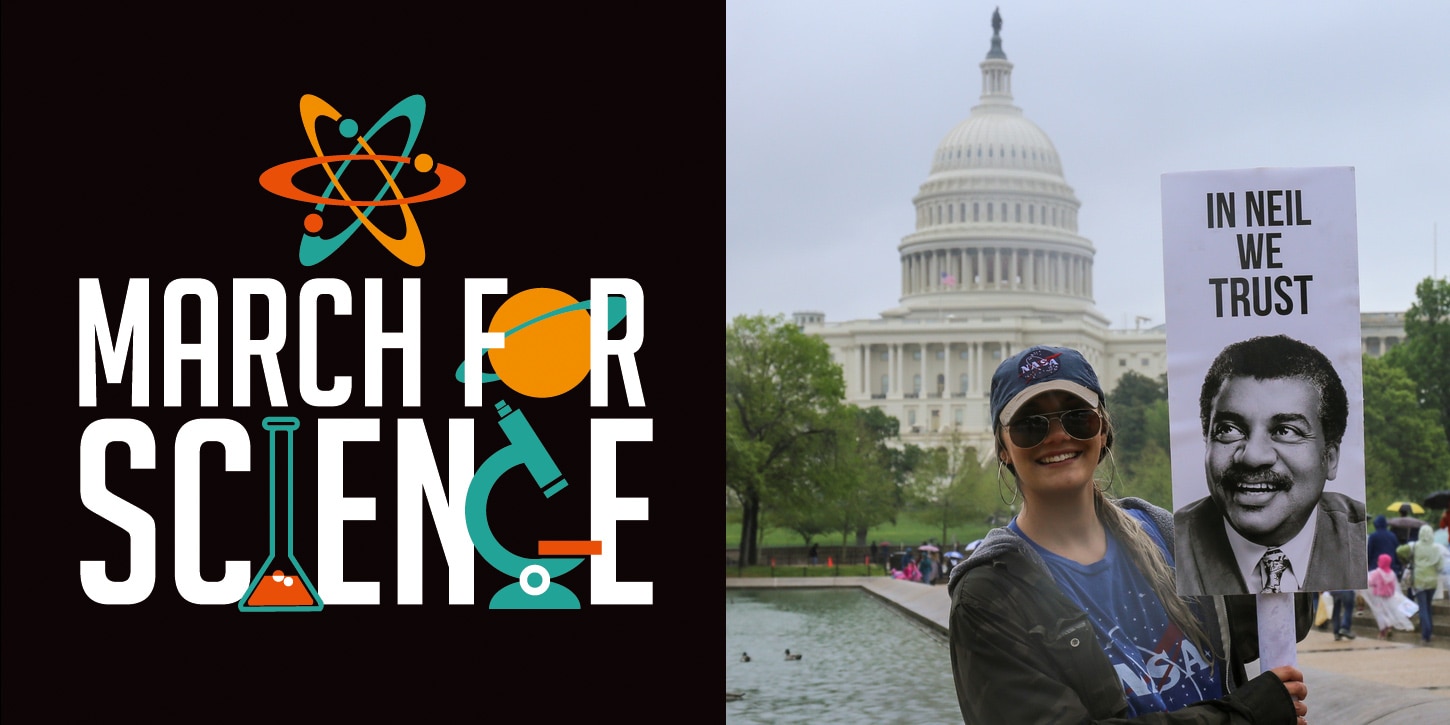Create a free profile to get unlimited access to exclusive videos, sweepstakes, and more!
What do we do about the onslaught of attacks on science?

Science is under unprecedented attack in America.
This is so clear I hardly need enumerate the offenses. I’ve written about this topic in detail and in general hundreds of times, including climate change denial, anti-vaxxers, evolution deniers, sex education, promotion of bunk alt-med treatments, and more.
In some cases, the direct outcome of such the attacks are easy to brush off; Moon hoax believers and chemtrail proponents are unlikely to have much of an effect writ large. I’d argue —and I have— the indirect effects are important, though, as denial of evidence and logic have an eroding effect on the public consciousness of science.
But in far too many cases, the stakes are extremely high: quite literally the future of the human race and our existence on this planet.
In support of the March for Science in April 2017, my friend and colleague Neil Tyson made a short video with Redglass Productions about our need for understanding science, and it’s very well worth your time to watch.
The words that struck me most in this were these:
… people have lost the ability to judge what is true and what is not, what is reliable and what is not reliable, what you should believe and what should you not believe.
This is precisely correct, and what to do about this isn’t clear. Work from the top down, and vote out politicians who abuse science? But you need a populace who understands the science and can see through partisan demagoguery, and is willing to act on that. That means better educating children about critical thinking and science, but who makes those decisions on education pedagogy? Local politicians, school boards...and round and round we go.
I have no silver bullet for this. But there may yet be a way out.
Neil makes a point of the difference between a scientific controversy and a political one. We know global warming is real, and that it’s changing our climate. The science is very clear on that. Any controversy on that statement isn’t scientific; it’s political. Ideological. If you want to argue the details of what factors are heating our planet, how much they’re heating our planet, and what the effects are of that heating, then yes, that’s science, and there’s much work to be done there.
But the basic conclusion that global warming exists is not scientifically controversial. It’s politically controversial, because the politics have been manufactured to be so. When a politician says they don’t think the Earth is warming, then you can be reasonably sure what industry is topping their funding list. So, actually, what they’re saying isn’t even a real political controversy. It’s just so much fertilizer wrapped in politics to make it sound like there’s an argument when there isn’t one.
Of course, understanding this and taking action are two different things. As has been shown many times, if you approach an ideologically driven group (say, climate change deniers) and start talking about the science, they’re extremely likely to switch you off within seconds.
So, what can you do?
Instead, approach it on terms they want to hear: economy, jobs, opportunities, local business and growth. Solar and wind power are now producing energy at about the same cost as fossil fuels, if not less, and are getting more efficient all the time. They employ far more people (mostly installers, skilled but relatively easily trained work) and are driving even more technologies like storage batteries, an industry where America excels.
Talking to someone who doesn’t trust vaccines? If you’re a parent, that’s your common ground. I have a daughter, and I want to do what’s best for her. My wife and I feel that keeping her (and us, for that matter) inoculated against preventable diseases is what’s best not just for her, but for everyone around her, too. We did our research, used our experience to weigh the evidence, and found that vaccination was the best way to do this.
Seeking that bridge, that shared value, is what gets you heard. Framing the argument to fit your audience is essential; without it, they won’t hear you.
These and other issues are critically important to our society. As Neil said, “When you have people who don’t know much about science standing in denial of it and rising to power, that is a recipe for the complete dismantling of our informed democracy.”
The ramifications of this are legion. After all, if you’re in a car about to drive over a cliff, denying the cliff exists, or that it’s not very high, or that cars have gone over this cliff before, is not going to save you. You have to acknowledge you’re in trouble and then you damn well better do something about it.
We are long past time to start doing something about it.
What can you do? Call your Representative. Call your Senator. Call your governor, your state school board, your city council, your aldermen. Find out where they stand on science… whatever science that might be. Vaccines, climate change, energy production, medical research, pollution regulation, laboratory financial support, evolution, education, technology development...find something that piques your own passion and ask them about it. If they support it, then thank them. If they don’t, then talk to them about it.
And when you do, find that common ground. Democracy is all about communicating with your government.
Hmmmm. “Your” government. That’s the biggest piece of this, isn’t it? Too many politicians think they work for party, or another politician, or their funders.
But they don’t. They work for you. And so, as the boss, it’s time for you to do a very serious employee evaluation.
Photo credit: Shutterstock / Michele Paccione / Joseph Gruber


























